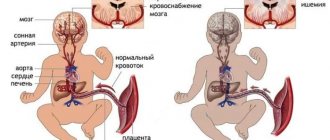A child’s restful sleep pleases parents, allowing them to fully relax and go about their business. However, sometimes children going to bed are accompanied by prolonged falling asleep, painful screams and severe hysterics. The child screams before going to bed, seemingly without any reason, it is impossible to calm him down. Child hysteria is understood as a state of excessive emotional arousal of a child, manifested by loud screams, crying, aggressive and inappropriate behavior. Particularly severe cases of hysteria can result in convulsions. However, for the most part, children's tantrums are the norm and are easily explained. Why does a child scream before going to bed? Knowing the nature and causes, you can prevent and prevent hysteria, and also understand whether you should seek help from a specialist.
Unstable schedule
The cause of nighttime tantrums in a 2-year-old child may be instability in the daily routine. Children react especially acutely to sudden regime changes. For example, he has just been sent to kindergarten, where everything is scheduled by the hour: classes, games, sleep an hour, walks, and so on. At home, the child had a completely different regime: he could play when he wanted, sleep when he was tired, eat as required, and walk only with mom or dad. In kindergarten, children are taught a different routine, and now they play outside with the teacher and other kids.
If the child does not yet attend kindergarten, then it is necessary to establish a schedule. The baby should wake up and fall asleep at the same time. Eat according to the clock, walk according to the schedule. In the future, this will help you easily adapt to the kindergarten regime, and the changes will not affect the baby’s psyche.
Adults easily cope with changes such as a change in lunch or rest, but children still have a very weak nervous system, and any changes are real stress for them.
Another reason for night tantrums in a 2-year-old child can be an increase or decrease in daylight hours. For example, they put him to bed when it was already dark, but here it was light. Or vice versa - they went to bed when it was still light, but now there is darkness around, and against this background the baby may have nightmares or, upon sudden awakening, imagine something.
Hysterical in a one and a half year old child
Hysteria in children does not happen for no reason; to deal with this, it is worth taking a closer look at the types of a complex phenomenon. Parents will then be able to navigate in order to build a line of behavior.
Stress in a child
Hunger, fatigue, thirst, tightness in clothing accumulate over some time and the body cannot stand it. The cause of stress can be a change in environment: the child plays with his favorite toy or in the sandbox, but the mother decides enough is enough and pulls her out of the calm state. But you can do it differently by saying: “Let’s go see what dad (grandmother, brother) is doing.” And gently taking your hand and quietly leading you away. And then a child’s hysteria at one and a half years old from stress will resolve itself.
And you also need to make it clear to your dear little creature that he is loved undividedly, no matter what condition he is in. This increases self-esteem and makes stress easier to overcome.
Read about how to respond to a child's tantrum. And also about how to cope with a child’s whims.
Stress can also be provoked by a mother if she is in an excited state and endlessly pulls the child for one thing or another. Or it will wake you up ahead of time, then the child will become hysterical after sleep. It is difficult for a child who has not had enough sleep to cope with the stress that he or she finds himself in due to the fault of loved ones. Therefore, you need to cope with your grievances towards someone, and gently hug the baby and even take him in your arms, kissing him tenderly. Make it clear that this is not his fault.
Rebellion against foreign influences
Tantrums for this reason are the result of an incorrect approach to education. This is when parents, looking at others, raise a child no worse than that of a neighbor or relatives. And by adhering to natural upbringing, not the zombie type, but what is best for your child, hysterics will be rare, and even then due to stress, they will completely disappear over time.
If you mold a child in the image in which you wanted to see yourself, this is direct violence against the natural needs of the child. There are many examples of this, when already in adulthood, having taught from childhood, children were sent to study at one educational institution, but in life they took place in a different profession. But the wrong approach begins from early childhood. And so, when children are broken, they dodge and become hysterical.
Parents need to stop to analyze their behavior if irritation is splashed out at their daughter or son, his psyche will suffer, and trust will be broken. And it is sometimes very difficult to regain trust even at that age.
Letting your child cry in order to remove the pressure is the best way out and course of action in such a situation.
Relief from nervous tension
Nervous system tension occurs after long periods of communication with strangers, vigorous games with children or relatives, dear. Uncoordinated actions of parents can also have an impact, when one leads to sleep, the other tries to continue playing.
You need to help the baby relax, and if he tantrums for about 15 minutes, there’s nothing wrong with that. But don’t touch him with comments and persuasion; it’s better to sit quietly next to him or gently hug him. There are other types of hysterics that parents need to know in order to establish contact with their children.
Has your child ever had tantrums before bed? How do you deal with such situations? Share your experience in the comments! And also watch a video on how to wean your child from hysterics.
Busy evening
Children's night tantrums in a 2-year-old child can occur due to overwork in the afternoon. Many people like to go shopping and take their kids to entertainment centers after their children's nap. And most often adults go to visit in the evening.
The child’s program should be intense before nap time; in the afternoon he becomes very tired. Advice to parents: at least an hour before bedtime, you need to collect all the toys, persuade the child to play calm games, take a bath, watch a good cartoon, read a fairy tale. An hour before bedtime, the baby should calm down mentally. Playing games in entertainment centers or visiting people should be completely excluded. If you need to get out of the house at this time, it is better to ask grandmothers, aunts, nannies or other people close to the child to sit with him.
How to deal with a crying baby
The baby cries when he wants to eat. Even if he recently ate, something probably distracted him and the baby pulled away from the food before he was satisfied. The baby may swallow air during feeding and experience a false sense of fullness. When the excess air is burped, space in the stomach is freed up, and the baby will again feel hungry. In any case, it would be a good idea to offer your child something to eat.
The body of young children has difficulty maintaining a constant body temperature. Any changes in ambient temperature are difficult for the baby to perceive. The mother must examine and touch the baby.
If your baby's upper back is hot to the touch, he is overheated. If it is cold, and the child tries to move little, he is frozen. Next, you need to create comfortable conditions for the baby - either warm him up, undress him, or replace him with lighter clothes.
When dressing a child, it is important to choose things that are comfortable for the baby. Any fasteners located on the back or tummy, when the baby already knows how to roll over, can cause him discomfort. Sloppy seams, tight elastic bands - all this will not go unnoticed by the baby. Perhaps he is crying due to the discomfort caused by his clothes.
Any sharp sounds or bright light can scare the baby. If the mother notices something like this, it is necessary, first of all, to eliminate the source of the baby’s fear.
Perhaps the child is crying because he is bored. The baby is tired of being alone, he requires the attention of an adult. First, the baby begins to grunt quietly, giving signals. If they are left unattended and the mother does not come soon, the child may become hysterical. Don't delay and wait for the child to cry. It is advisable to approach him when he just begins to act up.
Overwork is a common cause of moodiness. Tantrums happen at the end of the day when the child is tired. His day was long and eventful, he received many new impressions. The nervous system, unable to cope, thus gets rid of stress. For children, a well-established routine, timely bedtime, and proper alternation of activity and rest are important. Children who live according to a routine are calmer and more confident.
No daytime rest
It is this factor that can provoke night tantrums in a 2-year-old child. Until this age, children must rest during the day. With the onset of two years of age, many mothers and fathers make a mistake: the baby does not ask to sleep, so let him play, fall asleep earlier in the evening and sleep more soundly throughout the night. You can't give up daytime sleep. For a child, a whole day is a very long period; the baby’s body must rest for some time.
Many children really do not feel tired, and when their mother calls them to sleep for an hour, they refuse, run away, and may even begin to act up. It’s okay, try to calm the child as much as possible, he will definitely fall asleep.
Peculiarities of the child's psyche that affect falling asleep
A child is born with not yet fully formed systems and organs. Thus, children develop the skill of distinguishing day from night only a month and a half after birth.
Infants have a different sleep structure from adults, with short and rapidly changing phases:
- An adult's sleep has 4 phases;
- In a child, the third phase is formed by the first year of life.
The baby's sleep begins with a superficial or rapid phase, when the nervous system and brain are actively working, digesting information received in large quantities during the day. Also during this period, muscle activity is observed that can frighten and wake up the child. Transitioning from one phase to another can also cause your baby to scream and cry in the middle of the night.
In children under 4 years of age, the nervous system is designed in such a way that excitation processes dominate over inhibition processes. The exception is 10-15% of children who can feel overexcited and cope with it.
Here are examples:
- Only little phlegmatic people can fall asleep on their own without the help of their parents.
- Choleric children painfully fall asleep due to excessive excitement characteristic of this type of temperament.
- Sanguine people have a large supply of energy, which allows them not to get tired for a long time and interferes with the process of falling asleep.
The developmental characteristics of a child allow him to begin to independently cope with overexcitation only by 3.5 years, and in practice, six months later. Until this age, it is easy for a child to become overexcited and requires a lot of work to calm down. For this reason, children scream and cry, especially before bed, when they need to relax.
We recommend reading! Click on the link:
Our ancestors were not afraid of children's crying. In their arsenal in case a child is hysterical before bed, there were lullabies and fairy tales, as well as various nursery rhymes to distract and calm an overexcited child.
Overwork overtakes the baby quickly and imperceptibly: one minute he was playing, and the next minute he can no longer control himself, screaming and crying like a knife. Parents are perplexed by such sudden mood swings and cannot understand the reasons.
Being able to notice the signs of approaching fatigue in time is a complex behavioral skill that not all adults have, and in children it is formed only by the age of 4.
Diseases
Night tantrums in a 2-year-old child can be triggered by an incipient or existing illness, accompanied by pain or high fever. Assess the baby’s condition throughout the day: were there any prerequisites for illness. Ask if anything hurts, take the temperature, even if the forehead is not hot.
Consistently recurring nighttime hysterics in a 2-year-old child, when there are no signs of illness, a stable schedule and no overwork, may signal high intracranial pressure or an unbalanced psyche. It is impossible to identify this on your own; you need to see a doctor.
Nightmares
Tantrums at night in a child can be caused by bad dreams. The cause of nightmares in sleep can be cartoons watched before bed. Today there are a lot of cartoons (especially animated series) that feature villains, monsters, evil robots and other evil spirits. For a child, especially a two-year-old, watching such programs is harmful and dangerous; they do not have the best effect on the psyche.
Do not turn on cartoons for your child at night at all, unless they are stories about Winnie the Pooh or other good characters (with no villains). For example, “Smeshariki”, Soviet and Disney cartoons are perfect. And best of all, before bedtime, don’t turn on the TV for your baby at all, play a quiet game, read a fairy tale.
Unfavorable psychological situation in the family
Children react sharply to the family situation. If parents swear, drink, scandals and even fights happen - all this affects the child’s psyche.
A child can get nervous even when parents scold an older brother or sister for getting a bad grade at school, doing homework, for lack of order in the room, and so on.
You should not yell at a two-year-old child, much less spank him for some pranks or carelessness.
You can always explain everything to everyone calmly. Avoid scandals at home, especially in the presence of children, and especially do not yell at them. Children's psyche is very weak. First, nightmares, hysterics, and then more serious psychological disorders may appear.
Psychological Factors in Crying
Increased excitability is far from the only cause of children's tantrums before bed.
Along with overexcitation, there are some psychological factors that prevent a child from falling asleep peacefully:
- Violation of the regime. From the first days of a newborn’s life, it is necessary to establish a daily routine and strictly adhere to it. Lack of sleep hygiene not only leads to difficulties in putting the baby to bed, but also entails serious sleep problems. Forming in the child the correct associations associated with wakefulness and rest will also help to avoid hysterics.
- Unfavorable atmosphere in the family. Frequent quarrels between parents, loud screams, irritation and anxiety of the mother frighten the baby and increase his excitability. These factors can negatively affect not only the baby’s sleep, but also his mental development in general.
- Feeling of insecurity. During the first months of life, a child feels a close emotional connection with his mother. The absence of a mother creates a feeling of discomfort and loneliness in the baby. Then the child does not want to calm down and fall asleep alone, resists and throws tantrums.
- Night terrors. Infants do not experience night terrors: they miss the presence of their mother nearby. Children 3-10 years old are already consciously afraid to sleep in the dark. A developed child's imagination draws out the incomprehensible and unknown that may be hiding in the dark. 8 out of 10 children are afraid to sleep alone without light. The fear of the dark is mostly hereditary: if parents have such a fear, then in 80% of cases their children will also have it. Fear of the dark remains for life in 10% of people.
Children under 2 years of age cannot clearly articulate why they cannot sleep. Therefore, they often throw tantrums and cry before going to bed. This is the only way in their arsenal so far to show that something is bothering them.
The following cases may be reasons for contacting a psychotherapist or psychologist:
- if a child over 10 years old is afraid to sleep alone without light, talking about fantastic creatures hiding in his room (schoolchildren already perfectly distinguish between the boundaries of fiction and truth);
- if a child throws tantrums before bed, afraid to fall asleep, screams loudly and cries bitterly in his sleep, talks about death;
- if a child exhibits signs of a panic attack: uneven breathing, loss of consciousness, etc.
Even in the absence of these signs, parents should not ignore children's fears and worries. A common fear of the dark in a small family member without taking appropriate measures can lead to mental and nervous disorders. Children's fears, hidden deep in the subconscious, can be the cause of uncertainty and complexes in adulthood.
Conversation with a kindergarten teacher
The cause of nightly hysterics in a child may be that he is offended in kindergarten. Other children, even nannies and the teacher himself, can become offenders. We don’t see what’s going on in the kindergarten group, and the teachers may be hiding something.
Bring the teacher to an open conversation. Find out whether there was any inappropriate behavior on his part (he spanked your child or another in front of him), whether the teacher or nanny swears. This can be traced. Just stay in the garden for a while, come there during the day or earlier than usual to pick up your child, and talk to other parents. It is also necessary to find out whether the baby is being bullied by other children, whether there was an incident during games (fell hard, got into a fight, hit himself, etc.).
What makes an active baby whiny?
Many parents complain that their child often cries before bed even after feeding. Some babies cry for a long time. Why is this happening?
There may be many reasons, but if you asked a child and he could answer in a language that adults could understand, it would all come down to three simple things:
- hurts;
- eat;
- sleep (but I can’t sleep).
At the age of 3-3.5 to 5-5.5 months, parents often complain that the child cries before bed or while falling asleep. At 3 months he may still be bothered by colic. If the tummy hurts, the baby will not be able to sleep, and even after warming up on his mother’s chest, he will whine in his sleep. It is also not surprising that without carminatives, the baby sleeps poorly and constantly wakes up. Usually by this age, observant mothers understand by additional signs whether the child’s stomach hurts or not. And the pediatrician is already provided with information about which remedy is best to give him.
Night hysteria in a 2-year-old child: what to do?
So, you put your baby to bed, went about your business, or also went on vacation. And suddenly in the middle of the night a heart-rending scream is heard. What to do in a situation when the baby does not react to the fact that you have already arrived, breaks out of your arms and continues to scream loudly? Advice from a specialist for nighttime hysteria in a 2-year-old child will help parents quickly come to their senses and calm the baby.
- Under no circumstances should you give in to panic, because this condition is passed on to the child, and we do not need to aggravate his condition. Pull yourself together, because at the moment you are the baby’s guide from a nightmare to a calm reality. Start talking to your child, but without worry, calmly and measuredly.
- Show that the baby is not alone, remember some of his favorite fairy tales or funny incidents, talk calmly with the baby.
- Skin-to-skin contact can also help calm a frightened child. Hug the baby, gently pat him on the back, lie down next to him.
Hysterical behavior in a child up to one year old before bedtime
The formation of a child from 5-6 months to a year is a difficult time not only for the child, but also for the parents. The anticipation of birth is long over, and now the difficult everyday life of the baby’s growth is a stormy stream. And just at this time the teeth begin to cut through: the gums itch, the temperature rises, and drooling begins to flow. For a foolish person who had recently entered the world of people, stress fell upon him by chance.
In addition, in this period of development, the child is completely dependent on the mother: affection, attention, constant tactile touches. And this is not only feeding, washing and changing clothes. This is not enough. You need to periodically pick up, hold, and kiss the exposed parts of the child.
A child's sleep up to 12 months comes first after feeding. And if a child under one year of age begins to become hysterical before going to bed, there is no need to be scared or angry. The child subtly senses the mother’s condition, so on a subconscious level he develops a feeling of guilt for not being able to cope with negative emotions. This may be a consequence of the same itchy gums, a wet or tight diaper, a sharp frightening sound, or the baby’s unwillingness to go to bed. Hysteria at any age is a child’s rebellion, only the reasons are different.
The most correct reaction of parents is to take the child in their arms and caress, press their lips, and carry them around the room without shaking. Humors or folk songs in a gentle voice help a lot. You can give a couple of sips of slightly sweetened warm water from a bottle. And be patient. Under the mother's warmth and gentle voice, the child gradually calms down.
Watch a video about a child having a tantrum before bed.
Under no circumstances should you scream, much less hit a child. Otherwise, there will be a dead end - the child will not feel a fulcrum, and the hysteria will drag on for a long time. At this moment he is unprotected, what is happening is deposited in the subconscious, and in his future life it will manifest itself negatively in relation to his parents.
In the place of a helpless child, you need to imagine yourself to your parents when someone yells at them, but they don’t understand why. Love and understanding are the main trump cards of parents.
What to do after the first hysteria?
If this was an isolated case, then do not rush to resort to medication. Pediatrician Evgeniy Komarovsky advises using medications as a last resort. According to him, normalizing sleep is not drug treatment, but correction of conditions.
Install a night light with soft light in your child’s bedroom and ventilate the room before going to bed. Don't overfeed your baby before bed, but don't put him to bed hungry either. The food should be light; yogurt, milk with cookies, or a glass of sweetened kefir/ryazhenka are perfect.
Physiological causes of hysteria
The child grows and develops, changes occur in the body, sometimes causing discomfort.
The following physiological factors are noted that make a child cry and scream before bed:
We recommend reading! Click on the link:
- Teeth. 2-3 months before teeth appear, children may experience discomfort, irritation and anxiety. At the moment of teething, the child feels severe discomfort: the gums swell and turn red, the temperature often rises, and stool is disturbed. You can help your baby in this situation with the help of special cooling gels, painkillers and making the gum tissue loose so that it is easier for the teeth to break through. It is recommended to use antipyretic drugs that have an analgesic and anti-inflammatory effect. When the child is awake, you can offer him special silicone teethers that help relieve itching and have a distracting effect.
- Colic. New food and unformed intestinal microflora create discomfort and bloating in the abdomen of a newborn up to 3 months. This is often the cause of hysteria before bedtime. You can help your baby cope with this unpleasant symptom by massaging around the navel with a warm hand in a clockwise direction or placing a warm diaper on his tummy. It is also recommended to place the child on his stomach more often - this way the gases pass faster and less painfully.
- Hunger and thirst. Before going to bed at night, you need to feed the baby or give him water if he is not hungry. To avoid sleep disturbances, older children have dinner with adults no later than 3-4 hours before going to bed. If a child cannot fall asleep for a long time due to a hungry rumbling in the stomach, you can offer him kefir or unsweetened yogurt.
- Temperature conditions. A hot or cold climate in the room, as well as excessive dry air, prevents the child from quickly falling asleep and restful sleep. A comfortable temperature in the bedroom should not be higher than 19-21 degrees, and humidity should not be 50-70%. It is important that the heater is located at a sufficient distance from the crib in cold weather. In summer, it is enough to ventilate the room well or sleep with an open window located away from the child's sleeping place.
- Sleeping place and clothes. Tantrums before bed can be associated with an uncomfortable crib and bedding. For a comfortable sleep, the mattress should be moderately hard and even, the pillow should not be used until 2 years of age, and after that it should have a thickness equal to the width of the child’s shoulder, the blanket should be warm for the season, the linen should be fresh and preferably without zippers or buttons. Your child will sleep comfortably in loose, not too warm pajamas made from natural materials that do not have irritating seams or tags.
- Leather. Irritation and diaper rash on the baby’s delicate skin as a result of rarely changing a dirty diaper or due to poor body hygiene also provoke crying and screaming before bed. It is important to always monitor the fullness of the diaper and change it promptly, especially before bed.
The screams and crying of a small child can cause pain or the presence of a hidden disease. When a child regularly has difficulty falling asleep, sleeps restlessly, looks tired and loses appetite, it is necessary to seek help from a doctor as soon as possible.
Medication solution
For nighttime hysterics in a 2-year-old child, medication should only be prescribed by a specialist and only after the cause of the disturbing sleep has been established. You should not prescribe pills to your baby yourself, they can only cause harm.
Usually, to improve sleep, a course of Magnesium B6, Glycine, and soothing teas, for example, Evening Fairy Tale, are prescribed. All these remedies will not harm the baby, but still you should not start giving them to the child without a doctor’s prescription, who will determine the correct dosage and frequency of administration.
Folk remedies
How to save a 2-year-old child from nighttime tantrums? Drugs may not be required at all, because there are many traditional methods for improving children's sleep and getting rid of nightmares.
- Aromatherapy. Before going to bed, bathe your baby in warm water and add a few drops of lavender oil to the bath. This remedy has long been used for deep and restful sleep. The same oil can be dripped onto the far corner of the child’s pillow or blanket. After a couple of hours, it will begin to smell fragrant, giving the baby a restful sleep.
- “Sleepy tea” can be bought at a pharmacy, or you can make it yourself. Brew 0.5-1 tablespoon of hop cones in a glass of boiling water, let it brew and cool, and before bedtime, let your baby drink a third of the glass.
- “Sleepy cocktail” will appeal to those with a sweet tooth. Grind a banana with half a glass of milk (warm) and half a glass of chamomile tea. Add two drops of motherwort and a spoonful of honey.












